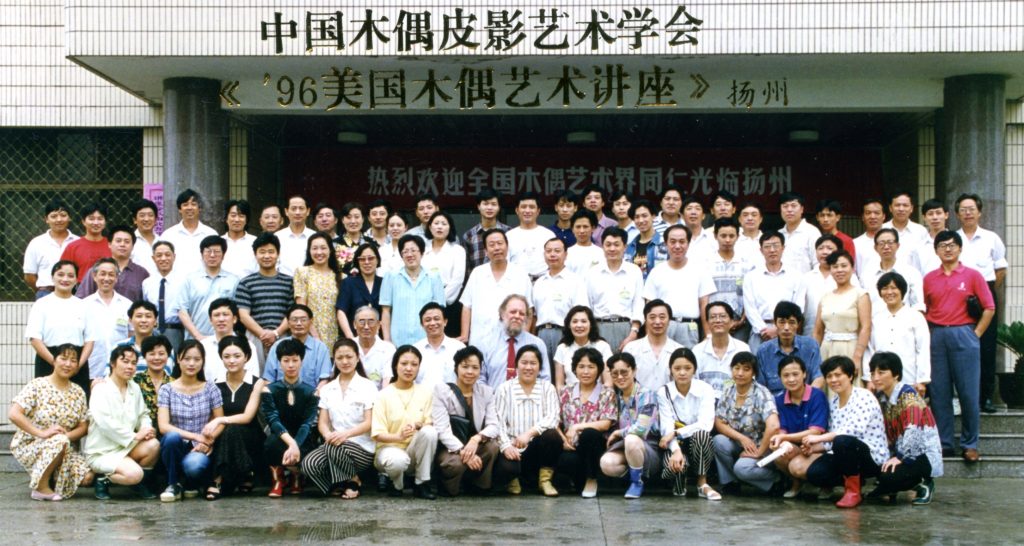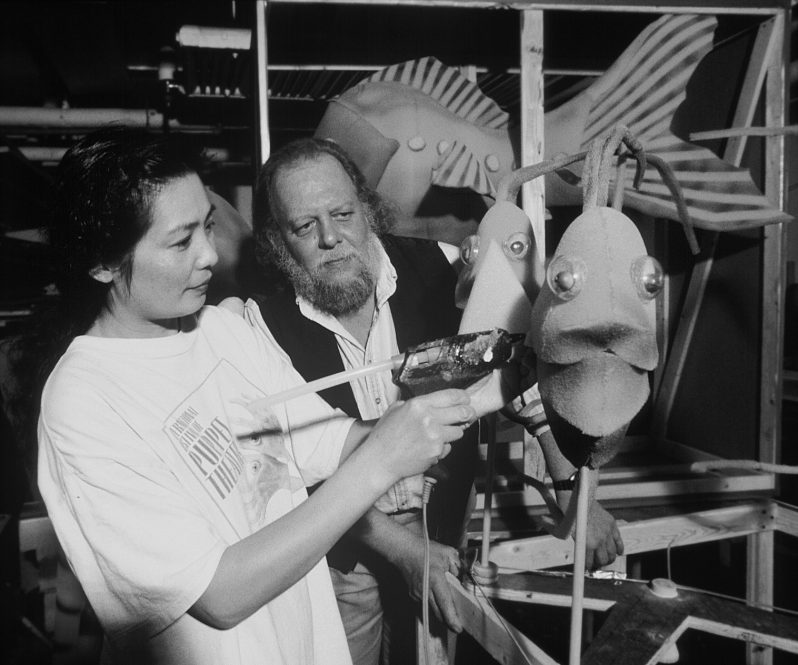In 1972, President Richard Nixon made a historic eight-day trip to Beijing to establish diplomatic relations with the People’s Republic of China, accompanied by a group of American officials that included National Security Advisor Henry Kissinger. One of the outcomes from the trip was the beginning of economic and cultural exchanges between the two nations.
In 1994, Bart Roccoberton Jr. ’90 MFA, head of the UConn Puppet Arts program, traveled to China accompanied by one of his creations, Mumford Maxwell Mole, as part of a U.S. Information Service cultural tour. Throughout his visit, his Chinese hosts were attracted to the puppet, cradling it like a baby.
“We kept hearing the phrase ‘Da Bizi’ anytime they talked about us. I learned that translated into ‘Big Nose,’ which was their word for foreigner,” Roccoberton says. “The mole puppet was the incarnate Da Bizi. We decided the television project we would eventually develop would have Mumford as a central character.”
The visit ultimately led to China becoming a member of the Union Internationale de la Marionnette, known as UNIMA, the international puppetry organization based in France and affiliated with the United Nations Educational, Scientific and Cultural Organization (UNESCO). In 2012, the UNIMA Congress, the international puppetry festival, was hosted by China.

Roccoberton’s role in China establishing an UNIMA national center is only one aspect of the international puppetry work that led to UNIMA-USA presenting him with a Special Citation as “North America’s Chancellor of Puppetry Education and Training for the Twenty-First Century.”
UNIMA-USA has annually recognized the best performances in puppetry arts since 1975 with its Citation of Excellence – UConn puppeteers have received six over the years – but its Special Citations are awarded to “individuals who have made extraordinary contributions to the organization and to puppetry.”
The citation says Roccoberton “has served the field of puppetry with indefatigable energy, perseverance, skilled leadership and exquisite craftsmanship… espousing an international perspective with an openness and love for all forms of puppetry…developing new audiences for puppetry.”
“The choice of the word chancellor was to show his bridge of education and for building the careers of puppeteers in the U.S. and beyond,” says Kathy Foley, president of UNIMA-USA’s board of directors. “Bart did a lot of international work that put American puppetry in places it had not been before. The Special Citation category is for people who over a long period of time have been contributing both artistically, in service, and usually in representation of what American puppetry is about to the wider world.”
Roccoberton is the twelfth recipient of a Special Citation. Among previous recipients are: Mollie Falkenstein, first General Secretary of UNIMA-USA; Jim Henson, best known for the Muppets and Sesame Street; Nancy Lohman Staub, creator of the landmark exhibit “Puppets: Art and Entertainment” for the 1980 UNIMA World Puppetry Festival; and Albrecht Roser, leading German puppeteer and teacher of puppetry arts recognized as a pioneer in establishing puppetry as an art form internationally.
“I’m honored. These are people I respect,” Roccoberton says of the recognition by UNIMA-USA that places him in the company of the major influences in his field. “The richness of what I do is the success of my students. American puppetry is gleaned from all traditions around the world.”
As a graduate student, Roccoberton helped to bring Roser to Storrs as a visiting professor, where the two became lifelong colleagues. He adopted Roser’s technique of using paper sculpture as the starting point to making facial features and body parts in puppets, which has influenced UConn puppeteers for more than three decades. Roccoberton was a founding director of the Institute of Professional Puppetry Arts and now is Director of Production for the National Puppetry Conference at the Eugene O’Neill Theater Center, where he invited international puppeteers to attend the conference and lead workshops. After working with Hua Hua Zhang ’00 MFA during his first trip to China, where she was a member of the China Puppet Arts Troupe of Beijing, he recruited her to the graduate program in puppet arts at UConn.
Roccoberton says that, early in his leadership of the Puppet Arts program, when University administrators asked faculty to include additional multicultural elements in their curriculum, he sent the syllabus for his shadow theater class, in which students study the history of that form of puppetry, starting in China and moving on to Indonesia, Malaysia, Cambodia, Greece, Turkey, France, and Germany.
“Bart has always had an international perspective on puppetry,” says Andrew Periale, editor of UNIMA’s “Puppetry International Magazine” and a former member of Roccoberton’s Pandemonium Puppets troupe. “Bart has had, and continues to have, an impact on the lives and careers of hundreds of aspiring puppeteers. Certainly he had an impact on mine.”
Adds Vincent Anthony, founder of the Center for Puppetry Arts and general secretary for UNIMA-USA: “Bart has been the guiding light of our scholarship program. This has been very instrumental in allowing puppeteers to gain much needed knowledge from top teachers for years. He single-handedly recruited the China puppeteers to join as a group, creating the Chinese UNIMA Center. This opened a floodgate of Asian countries to join UNIMA.”
Roccoberton says his students are interested in taking advantage of new technologies and materials in building their puppets, even as it continues to be a “hands-on art form.”
“I’m constantly learning. I think my students are ahead of me in those areas,” he says. “There’s a company called Smooth-On that makes endless produces in urethanes and silicones. My students are very interested in that. We are setting up projects for them to make, but they still have to learn how to make plaster molds. They need to know the foundations and from there they can move on to work with all these different materials. We’re preparing the next generation of puppeteers. Hopefully, they will be able to take the foundations that we’ve created and move on. I have to be smart enough to help guide them.”



